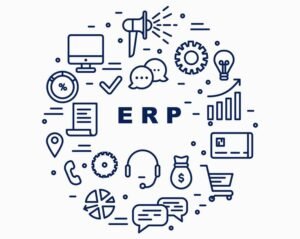Introduction
In today’s highly competitive and rapidly evolving manufacturing industry, businesses face constant pressure to improve efficiency, reduce costs, and deliver products quickly and with high quality. One of the most transformative tools that manufacturers can implement to achieve these goals is Enterprise Resource Planning (ERP) software.
ERP systems centralize all aspects of an organization’s operations—ranging from production and inventory management to supply chain and financials—into one unified platform. By integrating processes and providing real-time insights, ERP software enables manufacturers to optimize resources, increase productivity, and make data-driven decisions. This blog will explore in detail how ERP systems help manufacturing industries improve operational efficiency and remain competitive in the global market.
Streamlined Production Planning
Effective production planning is the backbone of any successful manufacturing operation. ERP systems provide manufacturers with real-time access to production data, including raw material availability, machine capacity, and labor resources. This data integration allows for better coordination and helps manufacturers fine-tune production schedules based on demand forecasts and inventory levels.
ERP systems also offer sophisticated planning tools that allow manufacturers to plan for multiple production runs, allocate resources more effectively, and adjust to any fluctuations in demand. The result is an optimized production process that reduces downtime, minimizes delays, and ensures that products are delivered on time. In turn, this improves customer satisfaction and reduces the risk of missed deadlines.
For example, if a manufacturing company is experiencing delays due to machine breakdowns or shortages in raw materials, the ERP system will provide real-time alerts, allowing the production team to quickly adjust schedules and avoid costly downtime.
Inventory Management Optimization
Inventory management in the manufacturing industry is notoriously complex, often requiring real-time monitoring of raw materials, work-in-progress, and finished goods. An ERP system simplifies this process by providing a complete, centralized view of inventory across multiple locations or production sites.

With ERP software, manufacturers can automate inventory tracking, generate reordering alerts when stock reaches predefined thresholds, and ensure that they always have the right amount of materials on hand without overstocking. This balance between supply and demand reduces wastage, minimizes storage costs, and prevents bottlenecks caused by material shortages.
Additionally, ERP systems enable manufacturers to implement just-in-time (JIT) inventory strategies, which further reduce excess inventory costs and ensure that raw materials are available precisely when they are needed. This level of control over inventory management enhances operational efficiency and reduces overall production costs.
Enhanced Supply Chain Management
Supply chain efficiency is crucial for manufacturing businesses, as any disruption can have significant consequences on production schedules and customer delivery. ERP software provides manufacturers with end-to-end visibility into their supply chain, from procurement and supplier management to shipping and logistics.
With an ERP system, manufacturers can easily monitor supplier performance, track shipments, and maintain updated records of all transactions. This real-time data enables manufacturers to quickly respond to delays, mitigate risks, and make more informed decisions when it comes to sourcing materials.
Moreover, ERP systems integrate with external vendors and logistics providers, facilitating smoother communication and collaboration. By automating procurement processes and maintaining optimal inventory levels, manufacturers can reduce the risk of supply chain disruptions and ensure the timely delivery of products to customers.
In today’s interconnected world, supply chains are becoming more global and complex, and ERP systems play a vital role in helping manufacturers manage these intricacies while maintaining operational efficiency.
Quality Control and Compliance
Maintaining consistent product quality and adhering to strict industry regulations are two of the most significant challenges for manufacturing businesses. Poor quality control can lead to defective products, costly recalls, and damage to a company’s reputation. ERP systems provide powerful quality management features that monitor quality at every stage of production, from the receipt of raw materials to the final product inspection.
With an ERP system, manufacturers can set quality control parameters, track inspection results, and maintain records of quality certifications. This automated quality management ensures that products meet customer expectations and industry standards. Additionally, ERP systems enable manufacturers to implement continuous improvement initiatives by analyzing quality data and identifying trends or areas for improvement.
Furthermore, ERP systems streamline regulatory compliance by generating reports and ensuring that manufacturers adhere to industry-specific regulations, such as safety standards and environmental guidelines. This compliance not only reduces the risk of fines or penalties but also enhances the overall efficiency of production processes by eliminating the need for manual documentation and compliance checks.
Financial Management and Cost Control
Manufacturers must closely monitor and control their finances to remain profitable, particularly in industries with tight margins. ERP systems provide a complete overview of a company’s financial health by integrating financial data from across departments, including procurement, sales, and production.
With an ERP system, manufacturers can automate financial processes such as accounts payable, accounts receivable, payroll, and tax management. Real-time financial reports allow decision-makers to track expenses, manage budgets, and forecast future financial performance with greater accuracy.
Cost control is another significant benefit of ERP systems. By centralizing financial data, manufacturers can gain insights into areas where they can reduce costs, such as inventory management, labor expenses, and production inefficiencies. The ERP system’s advanced analytics and reporting capabilities enable manufacturers to identify cost-saving opportunities and optimize their operations to improve profitability.
Workforce Management and Collaboration
Efficient workforce management is essential for maximizing productivity in the manufacturing industry. ERP systems centralize employee data, such as work schedules, timesheets, and performance metrics, making it easier for managers to allocate labor resources based on production needs.
With an ERP system, manufacturers can automate HR processes such as payroll, leave management, and performance evaluations. This automation reduces administrative burdens and allows managers to focus on more strategic tasks, such as optimizing workforce utilization and improving employee engagement.
In addition to workforce management, ERP systems facilitate better collaboration across departments. Manufacturing operations often involve multiple teams, such as production, quality control, procurement, and logistics. An ERP system integrates data from all these teams, enabling seamless communication and ensuring that everyone is working towards the same goals.
Data-Driven Decision Making
In today’s data-driven world, manufacturers must rely on accurate and timely information to make informed decisions. ERP systems provide comprehensive data from every aspect of the business, including production, finance, inventory, and supply chain. This data is presented in real-time dashboards and detailed reports, allowing manufacturers to gain insights into their operations and make data-driven decisions.
For example, an ERP system can help manufacturers analyze production efficiency, identify bottlenecks, and adjust their processes to improve output. Similarly, real-time sales data allows manufacturers to forecast demand more accurately and adjust production schedules accordingly.
By leveraging the power of data analytics, ERP systems enable manufacturers to identify trends, reduce risks, and seize new opportunities for growth. The ability to make informed decisions based on real-time data improves operational efficiency, reduces waste, and ultimately drives profitability.

Conclusion
For manufacturing businesses seeking to stay competitive in a fast-paced, global market, ERP software is a game changer. By centralizing data, automating processes, and providing real-time insights, ERP systems enhance operational efficiency, reduce costs, and improve decision-making. Whether it’s streamlining production planning, optimizing inventory management, or improving workforce collaboration, ERP systems empower manufacturers to operate at peak efficiency.
As the manufacturing industry continues to evolve, companies that implement ERP systems will be better equipped to adapt to changing market conditions, meet customer demands, and drive long-term growth.
If you’re ready to take your manufacturing business to the next level, contact us today to learn how our ERP solutions can help you achieve your goals.
Take the Next Step Towards Operational Excellence
Are you ready to streamline your manufacturing processes, reduce costs, and enhance productivity? Don’t let inefficiencies hold your business back. Invest in an ERP solution that’s tailored to meet the unique challenges of your industry.
Contact us today to learn more about our cutting-edge ERP software and how it can transform your manufacturing operations. Let’s work together to build a smarter, more efficient future for your business!




